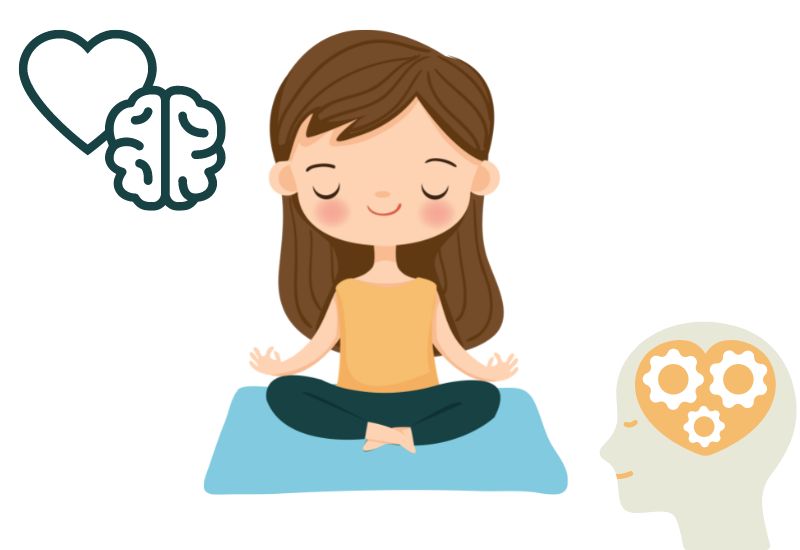Mindfulness isn’t a new concept. It has been around for quite some time. It’s now more popular than ever because it has been found that mindfulness is directly linked with mental health. It may seem like too much work and a bit jargonized to understand the concept of mindfulness. However, you will feel it is part of you when broken down into simpler terms. So, let’s discuss the neuroscience of mindfulness.
What is Mindfulness?
In layman’s words, mindfulness means being aware of your surroundings and living in the present moment without judgment.
In psychological terms, A.M Hayes and G. Feldman point out mindfulness as a concept. According to them, mindfulness is the opposite of both the act of avoiding emotions or over-engaging in emotions. There is no one standard definition of mindfulness because it is subject to one’s understanding of it. Some might think mindfulness is a mental state, while others see it as a set of cultivated skills and techniques.
According to David S. Black, mindfulness, hitherto a concept to be achieved by some people only, is now being seen as a measurable concept. Mindfulness is a trait, state, or practice. Let’s discuss the importance of mindfulness.

Benefits of Mindfulness
There are several psychological and physical benefits of mindfulness. It helps one divert their attention from the present as a mundane passing-by moment to one we appreciate. Further, it helps us in bringing profound changes in our day-to-day life, relationships, and work.
- Improved well-being: Being mindful allows you to savor the present and not stress about the future or dwell on the past. People who practice mindfulness do not feel anxious about the future and are better connected with others. They are more into the present moment, and this equips them to deal with unexpected or unpleasant situations in a mature way.
- Improved physical health: According to scientists, mindfulness doesn’t only improve overall well-being but positively benefits the physical health of an individual. It helps relieve stress because a mindful person isn’t constantly harping on the future and is anxious about success and failure.
- Improved mental health: Not just physical, mental health is yet another benefit of mindfulness. Practicing mindfulness meditation allows one to keep their anxious mind in check. Thereby reducing stress-related ailments like hypertension, high blood pressure, addiction, anxiety, depression, eating disorders, and anger management.
- Better relations: In the fast-track life today, one may not get time to catch up with friends and family. But when you are spending quality time with them, being mindful will help you interact and connect on an improved level. You will find yourself less distracted and more focused during conversations.
- Help with chronic health issues: serious ailments like cancer, chronic pains, eating disorders, and insomnia can be rectified by being mindful. It helps reduce pain, regulate mood swings, create a conducive environment for the body to sleep in, and rejuvenate.
Facts About Mindfulness
There are certain conceptions and misconceptions regarding mindfulness. The following section will throw light on the same-
- Mindfulness isn’t a vague idea. It is a part of our daily life, and it is not an exotic thing, either. It is something we do every day.
- Mindfulness is nothing extraordinary. It is not a special practice we need to adopt in our lives; it is a part of our human behavior.
- Mindfulness doesn’t require us to bring about drastic changes. Rather it helps us become better human beings.
- Anyone can adopt mindfulness practices. It is meant for everyone, and anyone can benefit from it by changing a few minor habits.
- Mindfulness helps improve the way we live. It makes us more aware of our surroundings and reduces unnecessary stress.
- Mindfulness isn’t just another mumbo-jumbo. It has been scientifically proven to bring about positive changes in the lives of people.
- In today’s ever-changing and complex world, mindfulness can help create a pattern for us to adjust and perform better in our daily lives.
- Overall, mindfulness has the capacity to change the way we behave socially, albeit in a positive way.

How Does Mindfulness Work?
Large volumes of evidence exist to demonstrate that mindfulness is related to how our brain works and other chemicals in our body that affect our mental as well as physical state. According to scientists, mindfulness leads to humans being less stressed and reactive about their surroundings. Rather, they are more accepting and aware of the two important ingredients to being mindful.
How Does Mindfulness Positively Alter the Brain?
Ample evidence supports that mindfulness leads to positive changes in the brain. Brain imaging studies discovered eight brain areas that were continuously altered and showed, “how does mindfulness affect the brain?” The important areas included-
- Body awareness (sensory cortices and insula)
- Self-awareness of thoughts and emotions (frontopolar cortex/BA10)
- Memory (hippocampus)
- Self and emotion regulation (anterior and midcingulate; orbitofrontal cortex)
- Communication between parts of the brain (superior longitudinal fasciculus; corpus callosum)
Mindfulness Reduces Episodes Of Emotional Pain
Our brain determines how we experience emotional pain. Moreover, people who practice mindfulness have experienced less activity in this area. This region is not that well connected with the prefrontal cortex, the region where emotions are processed. Overall, mindfulness reduces episodes of emotional pain.
Mindfulness Reduces Fearful Responses
This means people who meditate to calm themselves do not react impulsively, and fearful responses are reduced. They are more thoughtful of the present and appreciate the present moment. Amygdala, the region where threat responses originate, is calmed in people who practice mindfulness.
Mindfulness And Its Impact On The Physical Body
Being mindful means the body automatically relaxes and avoids serious health ailments. The parasympathetic system fixes the body after an episode of stress. The blood pressure is lowered, muscles relax, the heart rate reduces, and breathing becomes normal. Serious health issues like insomnia, diabetes and heart irregularities are also kept at bay.
A Word From BeyondPsychub
What does mindfulness mean? Mindfulness isn’t something that is meant for a certain section of people only. Simply doing mindfulness exercises, breathing exercises, eating mindfully, that is, relishing the food you are eating and focusing on it, and keeping yourself in check by reminding yourself to concentrate on the present can help you become mindful. Several times a day, we indulge in multitasking. We will be talking on the phone and simultaneously working on our laptops or cooking food. The end result is we cannot focus on either of the tasks. Therefore, mindfulness helps us stay focused and achieve better results.
















